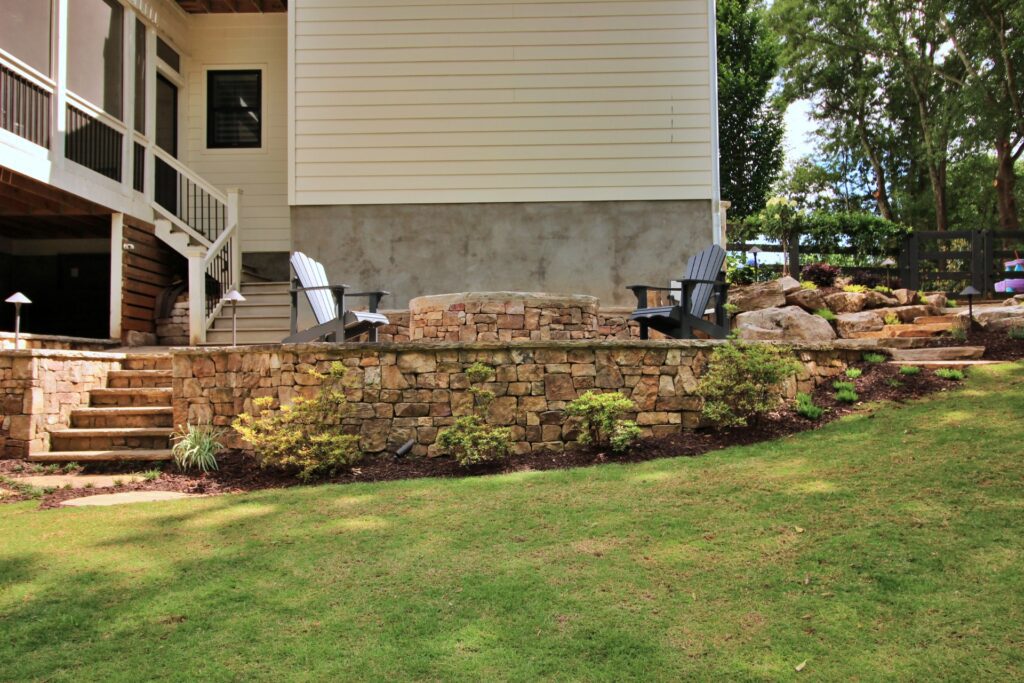Maintaining a beautiful, green lawn during the hot and humid Georgia summer can be a difficulty. Summer is some of the hottest months in Georgia, and it’s important to give your garden the right amount of water to keep it healthy. At P.O.P.S. Landscaping, the trusted landscaping service in Marietta, GA, we understand the importance of proper watering techniques. Here are some essential watering tips to help you maintain a beautiful garden and green lawn this September.
Understanding Your Garden’s Water Needs
Before diving into specific watering tips, it’s essential to understand your garden’s needs. Different plants and lawns require varying amounts of water. By recognizing these differences, you can ensure your garden remains healthy and vibrant throughout the hot summer months. Here are a few crucial things to consider:
Soil Type – Soil type plays a significant role in how water is retained and utilized by your plants.
- Sandy Soils: These soils have large particles and drain water quickly. As a result, sandy soils require more frequent watering to keep plants hydrated. The rapid drainage means that water doesn’t stay around the roots for long, so it’s important to water deeply but less often to ensure that moisture penetrates deeply into the soil.
- Clay Soils: In contrast, clay soils have small, tightly packed particles that retain water for longer periods. While this might seem beneficial, it can lead to waterlogging if overwatered. Plants in clay soils typically require less frequent watering but in larger amounts to ensure water reaches deeper layers without saturating the surface.
Plant Type – Different plants have varying water requirements based on their species and origin.
- Native Plants: Plants that are native to you, such as those found naturally in Georgia, are usually well-adapted to the local climate and soil conditions. They tend to be more drought-tolerant and require less water compared to exotic or non-native species. Incorporating native plants into your garden can reduce the need for supplemental watering and contribute to a more sustainable garden.
- Non-Native Plants: These plants often have higher water needs, especially those from regions with different climates. It’s crucial to research and understand the specific water needs of each plant type in your garden to provide adequate hydration without overwatering.
Weather Conditions – Weather conditions significantly impact your garden’s water needs.
- Hot & Dry Conditions: September in Georgia is typically characterized by high temperatures and dry conditions, which can increase the water needs of your lawn and garden. During heatwaves, evaporation rates are higher, and plants lose more water through transpiration. To counteract this, it’s essential to adjust your watering schedule to provide more frequent and deeper watering sessions.
- Humidity & Rainfall: On the other hand, periods of higher humidity and rainfall reduce the need for additional watering. Monitoring weather forecasts and adjusting your irrigation system accordingly can prevent overwatering and ensure your plants receive just the right amount of moisture.

Watering Tips for a Green Lawn
A green lawn is a key component of any beautiful home. Here are some watering tips to help you achieve and maintain a perfect lawn in September:
- Water Early in the Morning – The best time to water your lawn is early in the morning, between 4 a.m. and 10 a.m. This allows the water to soak into the soil before the heat of the day causes it to evaporate. Watering in the evening can lead to fungal growth, as the lawn remains damp overnight.
- Deep & Infrequent Watering – Instead of watering your lawn every day, aim for deep and infrequent watering sessions. This encourages the grass roots to grow deeper into the soil, making them more drought-tolerant. A good rule of thumb is to water your lawn about 1 to 1.5 inches per week, depending on rainfall.
- Use a Rain Gauge – A rain gauge can help you keep track of how much water your lawn is receiving from both rainfall and irrigation. This ensures you don’t overwater or underwater your lawn. If your lawn receives an inch of rain in a week, you can skip the irrigation.
- Adjust Your Sprinklers – Make sure your sprinklers are adjusted correctly to avoid overwatering or underwatering certain areas of your lawn. Check for any leaks or clogs in the sprinkler heads to ensure even water distribution.
- Mulch Your Lawn – Mulching your lawn helps retain moisture and keeps the soil cool. Organic mulches, such as grass clippings and shredded leaves, are excellent choices. Mulching also adds nutrients to the soil as it decomposes, promoting a healthier lawn.

Watering Tips for Garden Plants
In addition to maintaining a green lawn, your garden plants also need proper watering. Here are some tips to keep your plants healthy and thriving in late Summer:
- Water at the Base of Plants – Watering at the base of your plants ensures that the water reaches the roots, where it’s needed most. Avoid overhead watering, as it can lead to fungal diseases and water wastage.
- Mulch Your Garden Beds – Mulching your garden beds helps retain moisture, regulate soil temperature, and reduce weed growth. Organic mulches, such as straw, wood chips, and compost, are ideal choices. Apply a 2-3 inch layer of mulch around your plants, but avoid piling it against the stems.
- Use Drip Irrigation – Drip irrigation systems are an efficient way to water your garden plants. They deliver water directly to the roots, minimizing evaporation and water wastage. Drip irrigation is especially beneficial for vegetable gardens and flower beds.
- Group Plants With Similar Water Needs – Grouping plants with similar water needs together makes it easier to manage your watering schedule. This ensures that each plant receives the right amount of water without overwatering or underwatering.
- Monitor Soil Moisture – Regularly check the soil moisture levels in your garden beds. Stick your finger into the soil up to the second knuckle; if it feels dry, it’s time to water. For larger gardens, consider using a soil moisture meter for more accurate readings.
Additional Tips for Efficient Watering
Efficient watering practices can help conserve water and promote a healthier garden. Here are some additional tips:
- Install a Timer – Installing a timer on your irrigation system can help you maintain a consistent watering schedule. Timers can be set to water your garden during the optimal times of the day, ensuring efficient water usage.
- Regular Maintenance – Regularly maintain your irrigation system to ensure it’s functioning properly. Check for leaks, clogs, and damaged parts to prevent water wastage and ensure even water distribution.
- Avoid Watering During Windy Conditions – Watering during windy conditions can lead to significant water loss due to evaporation. Wait for calmer weather to ensure that the water reaches your plants and lawn.
- Rainwater – Collecting rainwater is an eco-friendly way to water your garden. Rainwater is free of chemicals and can be used during dry periods. Place water collection barrels under downspouts to collect water.
- Use Watering Cans for Small Areas – For small garden areas, consider using watering cans instead of hoses or sprinklers. This allows for more precise watering and reduces water wastage.

Need Landscaping Services? Call Us Today!
Maintaining a lush, green lawn and a thriving garden in Georgia, requires proper watering, especially during the hot months of Summer. By understanding your water needs and following these essential watering tips, you can count on a beautiful and healthy landscape all year long.
At P.O.P.S. Landscaping, we provide expert landscaping services to help you achieve the garden of your dreams. Whether you need assistance with lawn care or garden maintenance, our team of professionals are here to help. Contact us today for all your landscaping service needs and let us help you create a stunning outdoor space. We look forward to speaking with you about your home and landscaping project!



